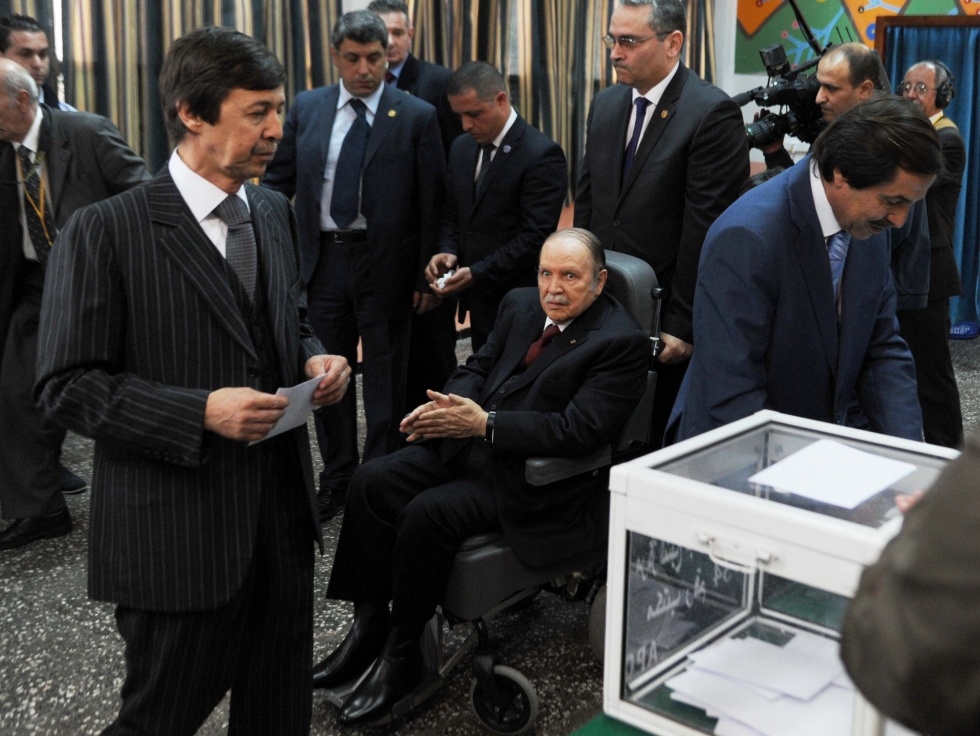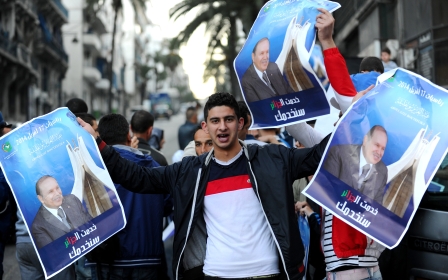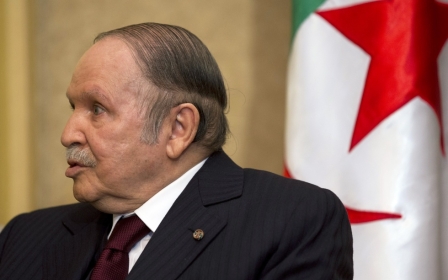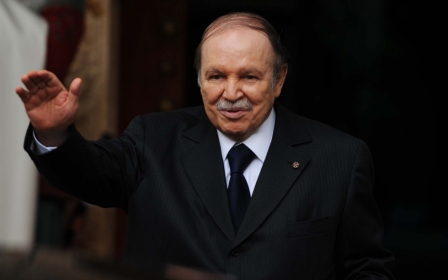Presidential win for Bouteflika does not mean end to dissent in Algeria

With Abdelaziz Bouteflika’s clear electoral victory – albeit amidst fraud allegations from his chief opponent – the aging president is set to serve his fourth term.
His supporters celebrated late into the night on Friday, after official preliminary results giving Bouteflika 81 percent of the votes.
Yet there are also signs that there is a broad push for reform in Algeria. Not only did the fierce debate surrounding the re-election of the wheelchair-bound president, who suffered a major stroke in April 2013 provoke the usual protests, it also brought serious dissent within the ruling elite itself out into the open in an unprecedented way.
Bouhedja Said, a member of the political bureau and head of communication for the ruling National Liberation Front (FLN), told MEE that the “crushing majority” represented a victory for the proponents of stability.
“It is a victory for the Moujahid Bouteflika. He is a symbol,” the FLN spokesperson said, referring to Bouteflika’s role in Algeria’s War of Independence. “I think these results are a success for the Algerian people. It shows support for continuity.”
New MEE newsletter: Jerusalem Dispatch
Sign up to get the latest insights and analysis on Israel-Palestine, alongside Turkey Unpacked and other MEE newsletters
Bouteflika’s critics, however, see the symbolism of the re-election of an incapacitated man as head of state in a very different light: as proof that the small group of men who have monopolized power for more than half a century are determined to cling to power until they die.
After a wave of protests in early 2011, in the context of the wider so-called Arab Spring, Bouteflika promised reforms to allow for greater political freedoms. Yet the crackdown on anti-Bouteflika protesters and media, and the lack of genuine competition in the presidential election suggests that little has changed. Many opposition parties called for voters to boycott, and the official participation rate in the election of 51 percent is widely believed to be considerably lower.
During the campaign, Bouteflika’s team reaffirmed that the reforms promised back in 2011 will be delivered if their man was re-elected. They even mentioned the possibility of a second republic.
“Certainly, he will change the constitution,” Bouhedja Said agreed. “Much work is needed to broaden democracy, to give more space to the opposition.”
Many in the opposition, however, want to be more involved in any reform process.
Ahead of the election, the Socialist Forces Front (FFS), the country’s oldest opposition party, called for a wide-reaching conference to create a roadmap of consensus for a genuine democratic transition to pull the country through what it described as the “national crisis”.
Karim Baloul, a senior figure in the FFS, said that many political actors are talking about consensus and some form of transition, and that they hoped this would lead to sincere change.
“It is going to be a very long task,” he said.
The party wants a much wider process rather than the FLN-led initiative dating from 2011, he said: “That was just make believe”.
Ali Benflis, a member of the FLN who was the lead contender to Bouteflika, told MEE on Thursday that he supports a consensus process, a new constitution and an end to the ban on protests.
Civil society groups are also pushing for more substantive change, with a collective of Algerian NGOs, including the Algerian Human Rights League, SOS-Disappeared, the National Autonomous Students’ Union, the Youth Action Collective (RAJ), along with several others, issuing a joint statement on Saturday announcing a meeting next Saturday to begin wider dialogue. “Pseudo dialogue, false reforms and sham elections cannot produce the change Algerians yearn for; the impasse and political crisis have only become deeper,” their statement said.
The most significant challenge to the closed nature of the political system came with the October 1988 uprising. After a brief period of genuine pluralism and freedoms, the door to democracy was slammed shut with the 1992 coup d’état. A decade-long civil war followed.
Ever since 1991, Algerians have been given the choice: stability and the status quo, or the terrifying alternative. Change has become synonymous with terror.
A repeat of the 1988 scenario appears unlikely, but there are growing fears that a failure of the ruling elite to provide a genuine, gradual transition will lead to disaster.
Amel Boubekeur, a specialist in Maghreb politics and a non-resident fellow at the German Institute for International and Security Affairs Berlin, said that the official statistics did not amount to support for the status quo.
“People didn’t vote for Bouteflika for ideological reasons. They’re voting not to give up their privileges,” she said. “[Bouteflika supporters] are the ones talking about stability, not the Algerian people.”
Despite the alternative initiatives coming from opposition parties for more comprehensive reform, the very structure of the Algerian political system, she said, meant it is unlikely any of these will gain traction.
Algerian civil society, intellectuals and opposition political parties are simply not strong enough, she said, and the international community seems unlikely to question Bouteflika’s election score.
“Unfortunately, the reaction of the international community yesterday, made me think that they have not gone beyond their double-standards when it comes to the Arab world,” she said.
For now, it appears any change in Algeria will be closely managed by the ruling FLN.
Middle East Eye delivers independent and unrivalled coverage and analysis of the Middle East, North Africa and beyond. To learn more about republishing this content and the associated fees, please fill out this form. More about MEE can be found here.




